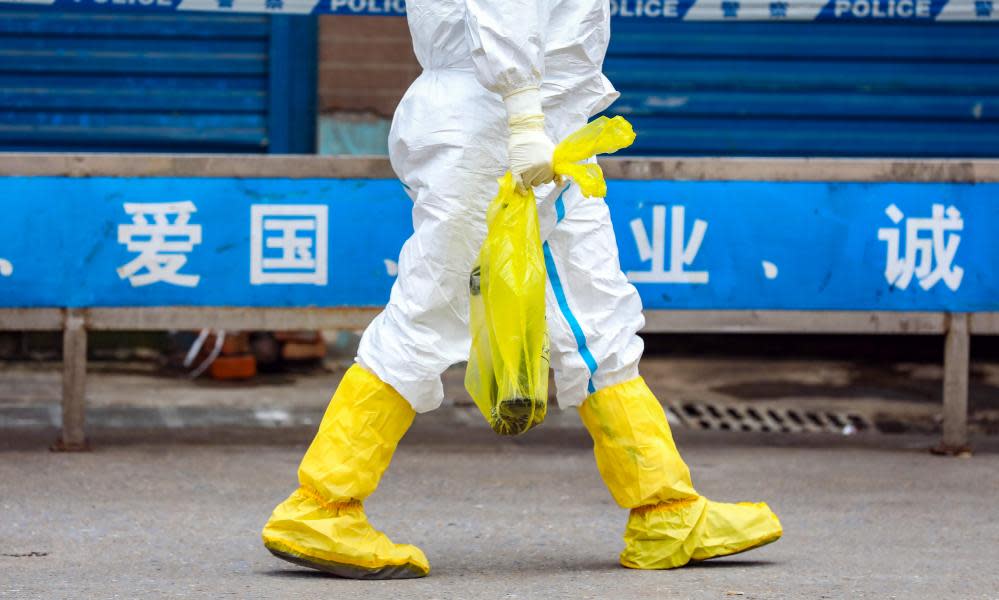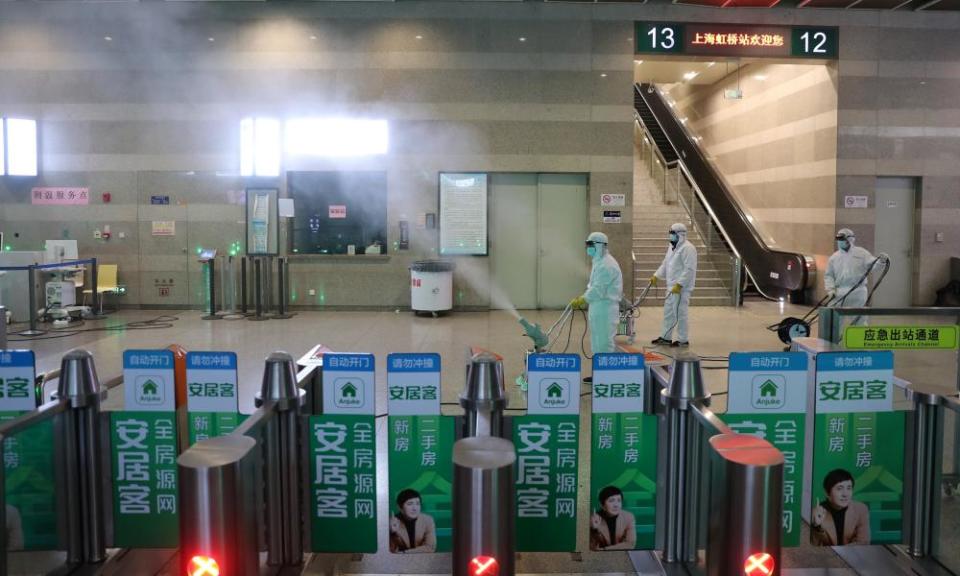Hong Kong cuts China transport links as coronavirus toll mounts

Hong Kong has announced major cuts to its transport links with mainland China, as several countries scrambled to fly their citizens out of city at the centre of a coronavirus outbreak that has killed more than 100 people.
Hong Kong’s leader, Carrie Lam, said high-speed trains and ferries that cross the border would be suspended from Thursday. The number of flights to mainland China would also be halved, she said, and personal travel permits for mainland Chinese to the city suspended.
Several countries – including Japan, the US and France – have announced they will evacuate their citizens from Wuhan, where the outbreak began in December and has since killed 106 people. Almost all transport to the city has been blocked and its hospitals completely overwhelmed.
The World Health Organization’s director general has criticised the evacuation plans, according to China’s foreign ministry. “Tedros [Adhanom] said the WHO does not advocate for countries to evacuate their citizens from China, adding there was no need to overreact,” the foreign ministry said in a statement. “He said the WHO is confident in China’s ability to prevent and control the epidemic.”
Meanwhile German officials said a German man who tested positive for the virus was infected by a work colleague, in what is believed to be the first human transmission in Europe.
On Monday, the British government, which has been accused of a slow response to the crisis, asked its citizens to contact the Foreign and Commonwealth Office so it could determine how many British people were in Wuhan. Matt Hancock, the UK health secretary, said citizens would be offered repatriation. It is thought that up to 300 UK nationals are in the wider Hubei province, where most deaths have occurred.
Several countries have also stepped up their warnings over travel to China, including the US, which is advising citizens to avoid non-essential visits to any part of the country. Previously it had warned only about non-essential travel to Wuhan or other parts of Hubei province, where most deaths have occurred. Germany and Turkey have released similar statements asking citizens to reconsider all travel.
default
Lam, who was wearing a face mask during her press conference, told Hong Kong residents to return from the mainland as soon as possible and quarantine themselves at home for 14 days. The cuts to travel links with the mainland follows calls by a union of hospital workers for the border to be closed. Hong Kong has recorded eight cases of coronavirus, and health workers had threatened to strike over the territory’s response to the outbreak.
Chinese companies are working overtime to produce masks, with five of the 12 main mask-producing companies based in Guangdong province resuming production after pausing for the lunar new year holiday, the business publication First Financial reported on Tuesday.
The World Health Organisation is recommending that people take simple precautions to reduce exposure to and transmission of the Wuhan coronavirus, for which there is no specific cure or vaccine.
The UN agency advises people to:
Frequently wash their hands with an alcohol-based hand rub or warm water and soap
Cover their mouth and nose with a flexed elbow or tissue when sneezing or coughing
Avoid close contact with anyone who has a fever or cough
Seek early medical help if they have a fever, cough and difficulty breathing, and share their travel history with healthcare providers
Avoid direct, unprotected contact with live animals and surfaces in contact with animals when visiting live markets in affected areas
Avoid eating raw or undercooked animal products and exercise care when handling raw meat, milk or animal organs to avoid cross-contamination with uncooked foods
Despite a surge in sales of face masks in the aftermath of the coronavirus outbreak, experts are divided over whether they can prevent transmission and infection. There is some evidence to suggest that masks can help prevent hand-to-mouth transmissions, given the large number of times people touch their faces. The consensus appears to be that wearing a mask can limit – but not eliminate – the risks, provided they are used correctly.
About 4,515 cases of the illness have been recorded across the country, including almost 1,000 people in critical condition, according to state media. Though the number of cases appears to have risen quickly, from 2,887 on Monday, this was likely to be due to better reporting, and the numbers remain small compared with the population.
On Tuesday, Beijing confirmed the city’s first death from the virus.
An American citizen working in Wuhan, who asked not to be named, said she had secured a seat on a US flight, and expected to be quarantined afterwards for up to 14 days. “It could either be in a hospital or a hotel,” she said while travelling to the airport.
“I plan to visit relatives back in the states, but they live across the country in Missouri and Alabama so it will be even more traveling. I don’t want to avoid family for too long,” she said, adding that she had ot shown symptoms and had been taking precautions.
Many American people will not have secured a seat on Tuesday’s flight, which was planned mostly for consulate staff. Japan said its first flight would carry about 200 passengers, out of 650 citizens hoping to return, but that further airlifts would be scheduled.

China has encouraged citizens to reconsider the timing of overseas flights, and introduced sweeping domestic travel restrictions in an attempt to stop the spread of the disease. On Monday, officials postponed the end of this week’s new year holiday until at least 2 February in an effort to reduce the chances of infection during what is the country’s busiest travel season. In Shanghai, which has recorded 66 cases of the virus, the end of the holiday has been postponed until 9 February.
Further precautions have been announced in many cities, including bans on long-distance bus services, which are relied upon by migrant workers returning from their family homes after the break. Several big chains said they will temporarily close their stores in some areas.
Related: The disease always gets a head start: how to handle an epidemic
There were nearly 7,000 more cases suspected and awaiting confirmation, China’s national health commission said on Monday.
More than 10 countries have confirmed cases of the disease, though patient numbers outside of China remain small. On Monday, Canada and Sri Lanka said they had recorded first cases of infection.
Malaysia on Monday banned visitors arriving from Hubei, while Mongolia, which is heavily dependent on trade with China, has also banned cars from crossing the border with its neighbour.
Additional reporting by Michael Standaert in Shenzhen

 Yahoo News
Yahoo News 
